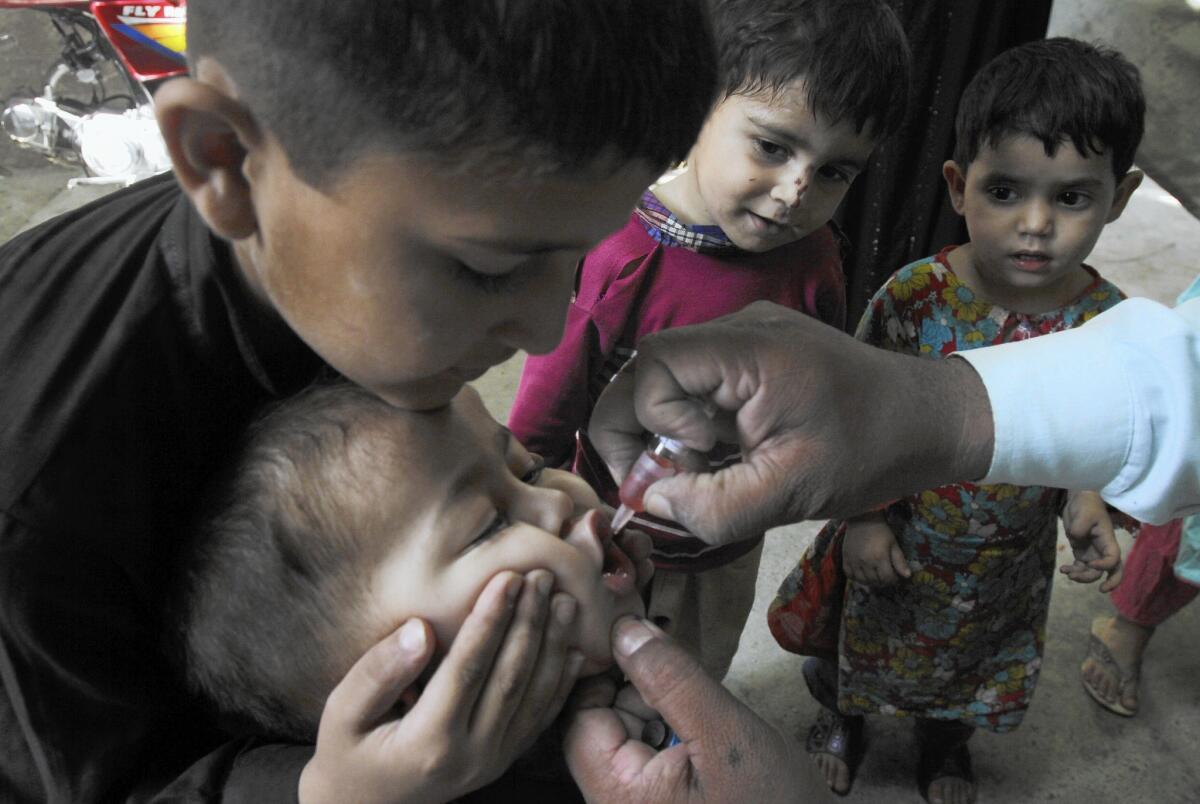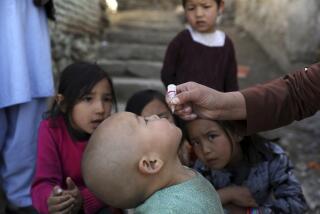Pakistan’s campaign against militants curbs another menace: polio

- Share via
Reporting from PESHAWAR, Pakistan — The Pakistani army’s nearly yearlong campaign against Islamist militants in the northern tribal belt has its skeptics, but one area where experts say its effect has been unmistakable is in battling polio.
Six cases have been reported this year in the Federally Administered Tribal Areas, down from 56 in the same period last year. In October, a quarter-million children could not be reached by vaccination teams; the number dropped to 47,000 by May.
Health authorities and relief officials credit improved security in the tribal areas since an army offensive against the Pakistani Taliban, which opposes polio vaccinations because it alleges they are a cover for Western espionage. In past years, militants routinely attacked health workers carrying out vaccination drives, along with their security teams, killing dozens.
The army provided advance warning of the offensive, which began last June, allowing residents as well as militants time to flee the tribal belt. As people have returned to towns and villages cleared by army operations, vaccination teams have resumed their work with greater access to areas once seen as off-limits.
“Pakistan has done remarkably well this year because the areas are now being cleared of militants and accessibility has become easier,” said Aziz Memon, chairman of Rotary International’s PolioPlus program in Pakistan.
“There are areas that are still not within reach, where fighting is going on, where we hope to get to sooner or later,” Memon said. “But the quality of the campaign has improved.”
A May report by the Independent Monitoring Board, which tracks progress in the Global Polio Eradication Initiative and had sharply criticized Pakistan in the past, cited “a positive difference” in the country’s anti-polio efforts.
Pakistan is one of only three countries, along with Nigeria and Afghanistan, where polio remains endemic. Of the 24 cases reported this year, all but one have been in Pakistan, according to the Global Polio Eradication Initiative.
Although most of the country is free of the deadly viral disease, which mostly affects children, it has been difficult to eradicate in several pockets, including the lightly governed tribal belt, the neighboring province of Khyber Pakhtunkhwa and the seaside metropolis of Karachi. The tribal belt had more than half of the 307 polio cases Pakistan recorded in 2014.
U.S. officials, who urged the Pakistani military for years to take stronger action against militants based on its soil, have offered qualified praise for the yearlong offensive, dubbed Zarb-e-Azb, the name of a sword said to have been used by the prophet Muhammad.
Although Pakistani military leaders say they have killed hundreds of fighters, the claims have been difficult to verify because the tribal region is all but off-limits to journalists, and many experts believe senior militants fled before the fighting.
In neighboring Afghanistan, officials attribute a surge in violence over the last year in part to militants who crossed over from Pakistan.
The offensive focused largely on the North Waziristan tribal area, home to several militant groups including a Pakistani Taliban faction led by Hafiz Gul Bahadur, who banned the polio vaccine in June 2012 and said he would allow it only after the United States ceased drone strikes.
More than 1 million Pakistanis fled their homes in North Waziristan and other militant-controlled areas, many taking shelter in displacement camps in Khyber Pakhtunkhwa. There, for the first time, health workers could reach families that had been inaccessible.
As a result, 86% of the tribal areas are now covered by the vaccine, up from 47%, according to health officials.
The Khyber Agency tribal area, near Peshawar, the administrative seat of Khyber Pakhtunkhwa, has emerged as a new trouble spot. It has recorded five of the six polio cases in the tribal region this year, and two areas, Bara and Jamrud, remain extremely difficult for health workers to access.
“Our workers have been attacked in Bara and Jamrud, and they do not feel safe,” said a health official in the tribal region who requested anonymity to avoid reprisals.
Dr. Naseer Hussain Shah, health director for the tribal areas, said that teams were slowly beginning to visit those areas and that workers could conduct door-to-door visits to provide oral vaccines in virtually all of the tribal region except Shek Toi, a small pocket in South Waziristan.
Yet international officials say serious challenges remain. Many militants have moved from the tribal areas to Karachi, and although the most recent case there was reported in September, the internal migration has increased fear that the virus could spread through the city of more than 20 million and to other parts of Pakistan.
The Independent Monitoring Board has also criticized Pakistan for problems paying salaries to its frontline health workers, whose morale has suffered because of the violence and administrative neglect. A prime ministerial task force that was due to meet quarterly to direct eradication efforts has not convened in nine months.
“We need the top leadership to take the ownership,” Memon said. “The results are good, but the work is not yet done.”
Special correspondent Ali reported from Peshawar and Times staff writer Bengali from Mumbai, India.
Twitter: @SBengali
More to Read
Sign up for Essential California
The most important California stories and recommendations in your inbox every morning.
You may occasionally receive promotional content from the Los Angeles Times.











